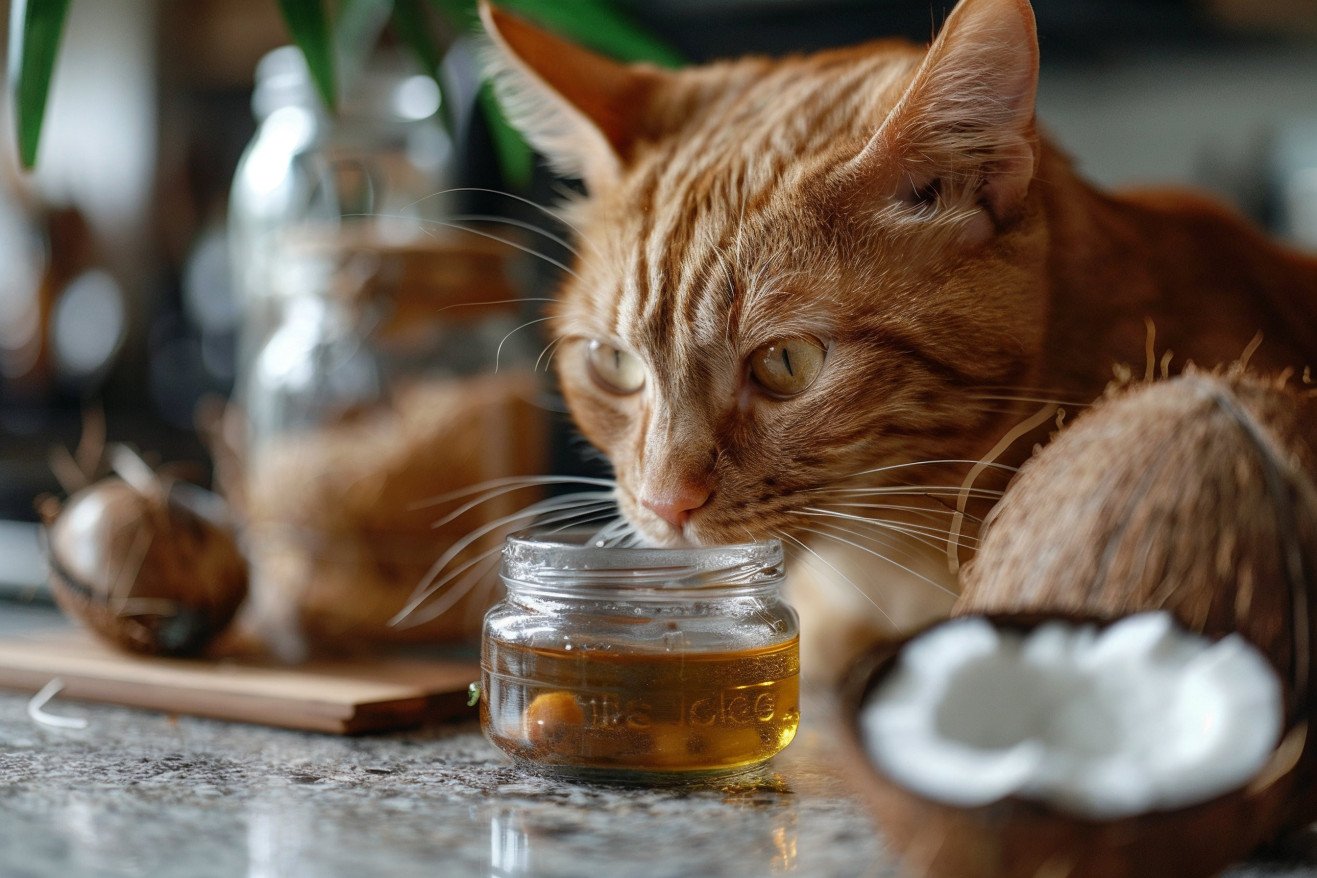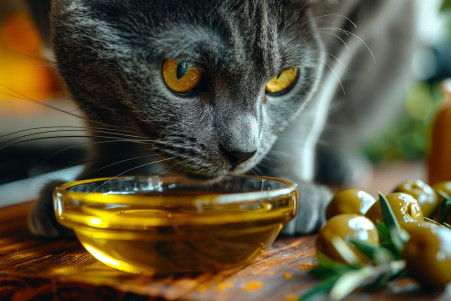Is Coconut Oil Safe for Cats? Benefits and Risks Explained
18 May 2024 • Updated 17 May 2024

If you're thinking about adding coconut oil to your cat's diet, there are several key benefits and risks to keep in mind. On the plus side, coconut oil can be good for your cat's skin and coat, may support healthy digestion, and has antimicrobial properties. On the other hand, overconsumption can lead to diarrhea and greasy stool. As a result, most veterinarians suggest a daily dosage of 1/4 to 1/2 teaspoon of coconut oil per 10 lbs of body weight.
To help you determine the best way to give your cat coconut oil, we'll take a closer look at the most recent veterinary research, including investigations into the nutritional composition of coconut oil and its potential impact on cats' overall health and well-being. By the end, you'll have the information you need to decide whether or not to add this trendy superfood to your cat's diet.
Is coconut oil safe for cats?
Benefits of Coconut Oil for Cats
The medium-chain triglycerides in coconut oil can help cats maintain healthy skin and coats by providing essential fatty acids. The easily digestible fatty acids in coconut oil also help prevent hairballs and aid in digestion. Coconut oil's antimicrobial and anti-inflammatory properties can also help support a cat's immune system.
Coconut oil may also help improve cognitive function and liver health in senior cats. In fact, some studies have shown that coconut oil can help prevent and treat conditions like pancreatitis and fatty liver disease because its medium-chain fatty acids don't need bile or pancreatic enzymes to be metabolized. However, more research is needed to determine the effectiveness of many of these potential therapeutic benefits. That said, coconut oil can be a helpful supplement for improving skin, coat, and digestion and potentially other aspects of feline health when used responsibly.
Dangers and Side Effects of Coconut Oil for Cats
As with any supplement, there are some risks associated with giving your cat coconut oil. According to The Drake Center For Veterinary Care, the high calorie and fat content of coconut oil can lead to weight gain and obesity in cats. It can also cause digestive upset, including diarrhea and greasy stool. The article also cautions that coconut oil can make conditions like pancreatitis and hyperlipidemia worse in cats that are predisposed to these issues.
In addition, TheCatSite points out that some cats may find the taste and texture of coconut oil unappealing, which can lead to concerns about inhalation or aspiration if the oil is forced on the cat. The article stresses the importance of talking to your vet before giving your cat coconut oil, especially if your cat has any underlying health issues.
While coconut oil may have some potential benefits, it's important to use it with caution and to watch your cat for any adverse reactions. As with any supplement, it's important to use coconut oil in moderation and with the guidance of your vet to ensure that it's being used safely and effectively.
How to Give Cats Coconut Oil
Earth Buddy explains that coconut oil can be given to cats by mixing the proper dosage in with their food. The recommended dosage is 1/4 to 1/2 teaspoon of coconut oil per 10 lbs of body weight per day. For kittens, Nikura recommends starting with 1/4 teaspoon per day and working up to 1 teaspoon over the course of two weeks. For adult cats, they recommend starting with 1/2 teaspoon and working up to 1-3 teaspoons per day.
It's important to start with a low dosage and watch for side effects like diarrhea or other digestive issues. Pet Health Hospital suggests mixing the coconut oil in with your cat's wet food or letting them lick it off your finger. It's important to note that coconut oil should not be used as a substitute for a healthy diet or any medications that your vet has prescribed. Always talk to your vet before giving your cat coconut oil.
How to Use Coconut Oil for Cats Topically: Skin and Coat Care
As mentioned in zooplus Magazine, one of the most common uses of coconut oil for cats is as a topical treatment to help with skin and coat care. The article suggests that you can use coconut oil to help moisturize, soothe irritations and even improve your cat's coat. To use it, the article suggests melting solid coconut oil in a warm water bath and then using your fingers or a cotton ball to gently apply the oil to your cat's skin, making sure to concentrate on any dry or irritated areas.
The Pikes Pouches blog offers even more detailed instructions, explaining that liquid coconut oil can also be used for direct application. They also note that you should make sure to be patient and gentle when applying the oil and to watch for any signs of discomfort or allergic reaction. If you notice any problems, they recommend that you stop using the oil and contact your vet.
Although using coconut oil topically can help with skin and coat care, Canadian Living explains that one potential downside is that cats may lick off the oil, which could cause digestive issues. They recommend using cat grooming products that contain coconut oil instead or talking to your vet if your cat has a severe skin condition.
Other Coconut Products for Cats: Meat, Milk, and Flakes
The white, fleshy part of the coconut is known as the coconut meat, and the best way to give it to cats is in shredded form, according to Can Cats Eat Coconut? | A Coconut Guide for Cats. Meanwhile, coconut milk is a processed product that is made by soaking shredded coconut meat in water and then straining it, says The Spruce Pets. However, like coconut meat, coconut milk is high in fat and calories and can be harmful to cats if they consume too much.
Although coconut meat and milk can be risky, Can Cats Eat Coconut? | A Coconut Guide for Cats suggests that coconut oil is the safest and most easily digestible form of coconut for cats. Coconut oil can be mixed with wet food and has a mild flavor, which makes it a good option for cats that are picky eaters. Still, the article warns that coconut oil is high in fat and calories, so it should be given in moderation. This is especially important because overconsumption of any coconut product can lead to health problems, including weight gain, pancreatitis, and liver issues.
Coconut Oil and Interactions with Other Supplements or Medications
Coconut oil may have interactions with other supplements or medications that a cat may be taking. Per Care.com, it's important to be cautious when using coconut oil for cats and to always consult a vet. The article explains that coconut oil is a fat and can lead to weight gain, so it should be used in small doses of half a teaspoon or less for adult cats, and even less for kittens or smaller cats.
The EveryCat Health Foundation warns against using coconut oil or medium-chain triglycerides (MCTs) in cats with chronic liver disease or inflammatory bowel disease (IBD). They explain that MCT supplementation is not recommended for cats with IBD, as the effects are unknown. Coconut oil can lead to side effects like flatulence or diarrhea, especially if essential fatty acids are not sufficient in the diet.
As mentioned by Untamed, feeding cats high amounts of fatty foods like coconut oil can also stress the pancreas and lead to diabetes and pancreatitis. The article stresses the importance of feeding cats a high-quality, meat-based diet and not overdoing it with the addition of coconut oil or other supplements.
In general, it's important to talk to a vet before giving a cat coconut oil, especially if the cat is on medication or has an existing health condition. It's important to use coconut oil in moderation and with care when considering it as a supplement for a cat's health.
Conclusion: Weighing the Pros and Cons of Coconut Oil for Cats
Although coconut oil has been shown to have potential benefits for cats in terms of skin, coat, and digestive health, the studies also make it clear that its use should be approached with caution. The high fat and calorie content of coconut oil can lead to weight gain and other problems, especially in cats with certain health issues or those taking medications.
Because of this, it's important to use coconut oil in moderation when giving it to your cat or using it in their grooming routine. It's also important to work with a veterinarian to determine the right dose, which can vary based on your cat's individual needs and health concerns. While some cats may be able to tolerate topical use, it's still important to watch for negative side effects.
In the end, the potential benefits of coconut oil may not outweigh the potential drawbacks for all cats. Pet parents should consider the research and talk to their veterinarian before deciding whether to add coconut oil to their cat's diet as a supplement.


